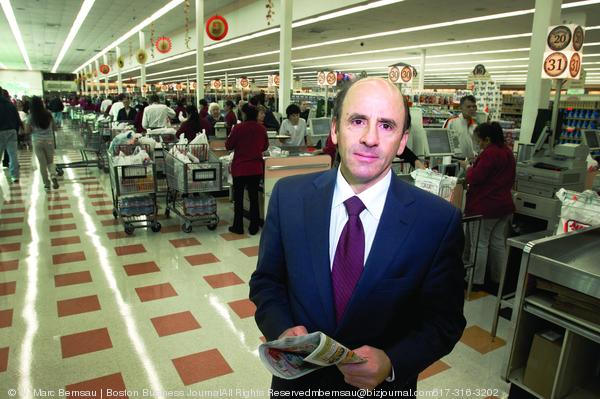After rumors swirled among fearful employees that Arthur S. Demoulas could end up putting the family-owned Market Basket chain for sale, a potential buyer finally emerged.
Of course, the fact that the interested buyer happens to be cousin and rival Arthur T. Demoulas, the chain’s former CEO, is giving employees reason for hope instead of fear. The company’s board of directors meets again today, and this offer — the financial terms haven’t been made public — is expected to be part of the discussion.
But the offer from Arthur T. and his side of the Demoulas family to buy 50.5 percent of shares that they don’t already own also raises some important questions about the value of the 71-store chain and who else might be interested in buying it.
Before the employee protests made Market Basket a page one story and left rows of produce and meat coolers empty, the company was one of the most successful chains in New England with $4 billion in annual revenue.
Small grocery retailers get gobbled up with relative frequency — Stop & Shop’s parent company just made a deal to acquire another one in Rhode Island. But the big deals, the ones that would be comparable to a Market Basket acquisition, are few and far in between, making it tough to do a quick back-of-the-envelope appraisal. Kroger bought Harris Teeter, a chain that’s roughly comparable to Market Basket in terms of annual revenue, last year for $2.4 billion. But Safeway, a business that’s nine times the size of Market Basket based on revenue, decided to sell itself to Cerberus Capital Management (owner of Albertsons as well as New England’s Shaw’s and Star Market) earlier this year for more than $9 billion.
I talked to a few experts who cover the business, asking them to speculate who might be interested in picking up Market Basket, if parent firm Demoulas Super Markets were put up for sale.
Mike Berger, senior editor at the Food Report of Food Marketing in Duxbury, tells me that potential interested buyers could include other chains with a presence here, such as Ahold’s Stop & Shop chain and Delhaize’s Hannaford chain. He says Kroger would be among the “out-of-market” companies that might take a look at this.
Jon Springer, the retail editor at Supermarket News, doesn’t think Ahold would be a serious bidder because of antitrust issues. (Stop & Shop is already the biggest chain in New England.) In the past, Kroger has been focused on contiguous markets, but in recent years, the management signaled that it’s willing to consider other acquisitions as well, Springer says. The catch, though, is that Kroger wouldn’t want to embark on a turnaround situation. Market Basket wouldn’t need a financial turnaround, but it’s still going to be tough to bounce back from the damage that’s been caused by the protests, Springer says. He also says New Jersey-based Wakefern, the parent of the PriceRite and ShopRite stores, has been expanding northward — but Wakefern is unusual in that it is a cooperative, so that ownership structure could make it harder to buy a company the size of Demoulas.
Of course, there’s no question that the protests have caused Demoulas Super Markets’ value to sink a bit in the past couple of weeks. The employee base is so determined to only operate as Market Basket under Arthur T., Springer says, that they seem willing to destroy the company under any other option.
Which brings us to Arthur T. If this fight between the two sides of the Demoulas family is just about business decisions, Arthur T. could probably come up with a price that Arthur S. would consider. But this isn’t just business. It’s personal. And no one from Arthur S.’s side — the group that gained control of the company roughly a year ago —is talking about it publicly to me or to anyone else.
There’s another option that could might work. Arthur T. could engineer a buyout that involves an Employee Stock Ownership Plan. Arthur T.’s side of the family could buy the entire stake they don’t already own, although they might need to borrow money to do so, and then they could distribute equity in the company over time as an employee benefit. Harpoon Brewery recently pulled this off when it faced succession issues of its own. Sure, Market Basket is a much bigger company than Harpoon. But that doesn’t mean ESOP approach is impossible for a big supermarket company. Springer points out that that Publix, in the Southeast, and HyVee, in the Midwest, are much larger grocery chains that also happen to be owned by employees.
It’s hard to know what will happen today at the board meeting. It’s safe to say the Arthur T. side is going to want a full appraisal of the business before agreeing to a price from his cousin, if not a full bidding process. So it would be tough to get a deal done today. But this proposal from Arthur T. could end up being an effective way to resolve a feud that’s hurting both sides of the family and the thousands of people they employ.
Update: Demoulas Super Markets’ board of directors issued a statement after today’s meeting, saying the board would seriously consider the proposal from Arthur T.’s side, along with “any other offers previously received and to be received.” The board says it will then make its recommendations to the company’s shareholders — essentially members of the two sides of the Demoulas family — after evaluating all the offers.








Leave a Reply
You must be logged in to post a comment.